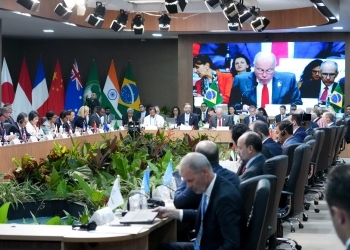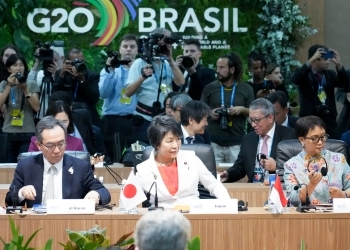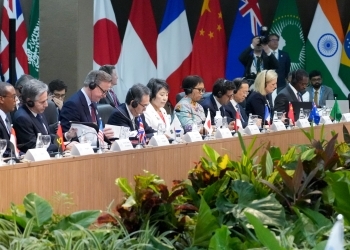G20 (Summit on Financial Markets and the World Economy)
G20 Foreign Ministers’ Meeting (Summary)
February 22, 2024



On February 21 and 22, the G20 Foreign Ministers’ Meeting was held in Rio Dejaneio, Brazil. Ms. KAMIKAWA Yoko, Minister for Foreign Affairs of Japan, attended it. The overview of the meeting is as follows. At the meeting, ministers discussed “the G20's role in dealing with the ongoing international tensions” in Session 1 and “global governance reform” in Session2, respectively.
1. Session1: “The G20's role in dealing with the ongoing international tensions”
In this session, Russia's aggression against Ukraine and the situation in the Middle East were mainly discussed.
- Introduction
At the outset, Minister Kamikawa explained that Japan would work to uphold and strengthen the free and open international order based on the rule of law, so that all people and all nations can enjoy peace, stability, and prosperity, and to realize a world where "human dignity" is protected, based on the vision of Sustainable Development Goals (SDGs), “leaving no one behind,” as well as on the concept of human security.
Minister Kamikawa introduced that, at the G7 Hiroshima Summit held last year under the G7 Japanese Presidency, Japan invited countries of the Global South including Brazil, and that the leaders shared the importance of the rule of law and the principles of the Charter of the United Nations (UN) such as respect for sovereignty and territorial integrity. Minister Kamikawa also stated that, building on such outcomes of the G7, the G20 New Delhi Leaders’ Declaration issued last year under the Indian G20 Presidency also sent out the unanimous message of upholding the principles of the UN Charter, including respect for sovereignty and territorial integrity. She further stated that Japan would continue to cooperate with a wide range of partners in the international community, including the G20 Brazilian Presidency this year.
Minister Kamikawa noted that today’s international situation is seriously affecting people's livelihoods including food and energy security, and that we need to put a brake on it before reaching an irreversible stage. From this perspective, she made her remarks following the three points; Ukraine, the Middle East, and WPS (women, peace and security). - Russia’s aggression against Ukraine
Minister Kamikawa stated that Russia, a member of the G20, is still continuing its aggression against Ukraine despite the condemnation of most leaders of the G20, and that this is an outrageous act that shakes the foundation of G20 cooperation and a great challenge to the rule of law that each country should support.
Minister Kamikawa stated that she visited Ukraine in January this year, witnessing the fresh scars of the aggression with her own eyes and came to reaffirm her conviction that any unilateral attempt to change the status quo by force should never be admitted. She stressed that Russia has to stop its aggression and we have to achieve a just and lasting peace of Ukraine immediately. Minister Kamikawa also pointed out that Russia’s nuclear threat, let alone its use, is absolutely unacceptable.
Minister Kamikawa introduced that Japan held the Japan-Ukraine Conference for Promotion of Economic Growth and Reconstruction in Tokyo on February 19, with the presence of Ukrainian Prime Minister Shmyhal, and signed 56 cooperation documents. She also explained that she had organic discussions with women who play active roles in the Ukrainian government, business, and civil society, in order to incorporate the perspectives of women and children into the recovery and reconstruction of Ukraine. She argued that she would like to contribute to international discussions while expanding such networks.
Many G20 members also stressed the need that Russia should stop its aggression and that we have to achieve a just and lasting peace in Ukraine. - Situation in the Middle East
Minister Kamikawa pointed out that the tense situation in the Middle East is having a direct negative impact on the global economy, and that Japan once again unequivocally condemns the terrorist attacks by Hamas and others, and is at the same time seriously concerned about the critical humanitarian situation in the Gaza Strip. In particular, she expressed her deep concern that an Israeli military operation in Rafah in the Gaza Strip could cause a grave impact on the safety of civilians.
Minister Kamikawa stated that Japan put importance on ensuring the environment in which humanitarian assistance activities can be carried out, promptly realizing a humanitarian ceasefire which would lead to the release of hostages, and then, realizing a sustainable ceasefire. With this in mind, she stated that Japan would call on all parties to observe international law including international humanitarian law and to act immediately from a humanitarian perspective, and continue its diplomatic efforts in a persistent and proactive manner. She also explained that, since the deterioration of the situation in Gaza, Japan has been actively providing humanitarian assistance to Palestine, and is considering a new emergency grant aid of approximately $32 million, additionally.
Minister Kamikawa stated that Japan will actively contribute to the realization of a "two-state solution," which the international community has been supporting, in cooperation with the countries concerned, so that the current tragedy would not be repeated.
Minister Kamikawa also stated that Japan unequivocally condemns the attacks on vessels in the Red Sea and the Gulf of Aden by the Houthis, and will take necessary measures to secure the freedom of navigation in close cooperation with the countries concerned.
Many G20 members also expressed their concern over the current humanitarian situation in Gaza, and stressed the need to improve the situation and the importance of a "two-state solution." - WPS
Minister Kamikawa underlined that the protection of women and children in the above-mentioned serious conflicts is an urgent issue. She also stated that we have better chance to achieve sustained peace by ensuring women’s participation in leadership positions to conflict prevention, reconstruction, and peacebuilding, pointing out that such way of thinking is also expressed in the UN Security Council resolutions related to WPS.
Minister Kamikawa stated that Japan is strongly promoting WPS from such viewpoint, introducing that she attended a side event on WPS with Indonesian Foreign Minister Retno last December where they highlighted the importance of mainstreaming WPS in the international community. Minister Kamikawa concluded by saying that she hopes to actively cooperate in the G20 this year so that such WPS perspectives will be reflected in G20’s discussions.
2. Session 2: "Global governance reform"
This session covered the reform of the UN including the Security Council, the Multilateral Development Banks (MDBs) reform, the World Trade Organization (WTO) reform and others.
- Introduction
At the outset, Minister Kamikawa stated that the international community is currently facing various global challenges such as climate change, food, and health, and that global governance reform is an urgent need to effectively address these challenges amidst the ongoing structural changes in the international community. She expressed her support for Brazil putting this a priority as the G20 presidency.
Minister Kamikawa made the point that in tackling these reforms, it is necessary to return to the starting point of "human dignity" and promote the human-centered international cooperation based on the concept of human security. - UN reform
Minister Kamikawa stated that she believes there is a consensus that the UN, the most universal international organization in the world and advocating the UN Charter, is the core of multilateralism. On the other hand, she told that it is essential to strengthen its functions in order for the UN to be able to play a role in addressing urgent and serious challenges in the current international community, 78 years after its establishment.
Regarding the enhancement of functions of the UN General Assembly, Minister Kawakami pointed out that UN member states were able to agree on strengthening the system to support the President of the General Assembly last year, including increased staff, and that Japan would like to contribute to enhancing functions of the General Assembly.
Minister Kamikawa underscored that the UN Security Council reform is a pressing issue, and that the Council needs to be expanded in both permanent and non-permanent members for its composition to reflect the current realities of the international community. She called for concrete actions looking ahead to the important milestones of the Summit of the Future this year and the 80th anniversary of the founding of the UN in the next year. - MDBs reform
Minister Kamikawa emphasized the importance of further progress in MDBs reform as we enhance our support for developing countries facing global issues, and stated that Japan supports the direction of the G20 to strengthen the functions of MDBs from a cross-cutting perspective, taking into account the discussions at the Executive Board of each MDB.
Minister Kamikawa pointed out that the use of existing capital and private capital mobilization are essential for strengthening lending capacity to developing countries. She stated, for instance, that Japan is ready to contribute to strengthening lending capacity of approximately US$9 billion through their innovative guarantee mechanisms of the World Bank and the Asian Development Bank. She also stated that we should make a success in the replenishments of the International Development Association (IDA) and the Asian Development Fund (AsDF), which support low-income countries.
At the same time, Minister Kamikawa stated that addressing the debt issues facing developing countries is an urgent challenge, and that rapid debt restructuring is crucial through such measures as the Common Framework for Debt Treatments beyond the Debt Service Suspension Initiative (DSSI). She also underlined that all creditor countries and debtor countries, including G20 members, need to share the recognition on the importance of transparent and fair development finance that complies with the international rules and standards. - WTO reform
Minister Kamikawa put an emphasis that, in order to uphold the rules-based, free and fair economic order, which is the foundation of global economy, it is essential to strengthen multilateral trading system through the WTO reform, and that it is crucial to achieve outcomes at the 13th Ministerial Conference next week.
Minister Kamikawa stated that Japan would like to achieve concrete outcomes, in particular, on the restoration of a fully and well-functioning WTO dispute settlement function by 2024. She also mentioned that it is vital to extend the e-commerce moratorium, which is beneficial to both developed and developing countries, taking into account the development challenges of developing countries. She went further that it is also important to conclude negotiations on the agreement on fisheries subsidies, among others. Minister Kawakami stated that Japan hopes to provide political momentum through cooperation at the G20. - Artificial Intelligence (AI)
On AI, which is a new agenda that we are facing, Minister Kamikawa raised the point that while the development of AI provides us with opportunities such as increased productivity, it also causes risks such as proliferation of disinformation, and thus a response by the international community is necessary.
From this perspective, she explained that Japan, as the G7 Presidency last year, launched the "Hiroshima AI Process" on governance of AI, and is leading the rule-making in the international community. Minister Kamikawa stated that Japan, based on such experience, would like to contribute to the discussion at the G20, toward ther realization of safe, secure, and reliable AI.
[Reference]
- G20 members
Japan, Brazil (Presidency), Argentina, Australia, Canada, China, France, Germany, India, Indonesia, Italy, Mexico, Republic of Korea, Russia, Saudi Arabia, South Africa, Turkey, United Kingdom, United States, African Union (AU), European Union (EU) - Invited countries
Angola, Egypt, Nigeria, Norway, Portugal, Singapore, Spain, United Arab Emirates - International organizations
Corporación Andina de Fomento (CAF), Food and Agriculture Organization (FAO), Interamerican Development Bank (IDB), International Labor Organization (ILO), International Monetary Fund (IMF), New Development Bank (NDB), United Nations (UN), United Nations Conference on Trade and Development (UNCTAD), United Nations Educational, Scientific and Cultural Organization (UNESCO), World Bank, World Health Organization (WHO), World Trade Organization (WTO)

